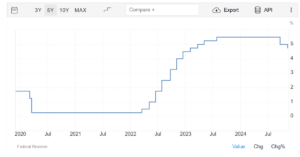
The Federal Reserve (FED), the central bank of the United States, was created on 23 December 1913. Its purpose was to create a safer, more stable and more

The Federal Reserve (FED), the central bank of the United States, was created on 23 December 1913. Its purpose was to create a safer, more stable and more adaptable monetary and financial system to the needs of the American economy. Currently, the FED is divided into four general areas of responsibility:
However, the Federal Reserve’s influence extends far beyond the borders of the United States, directly affecting and influencing the economies of other countries, including Brazil.
In this article, we invited expert Victor Arduin, energy and macroeconomic analyst at Hedgepoint, to explain how the organisation’s decisions affect the purchasing power of the real, the commodities market and Brazilian inflation. Enjoy the read!
The purchasing power of the dollar and its impact on the real
“The dollar is the most important currency for commercial transactions in the world.When the FED adjusts its monetary policy in order to control inflation or promote full employment in the United States, all global markets are affected in some way”, explains Victor Arduin.
The expert points out that when the FED raises interest rates, it strengthens the dollar against other currencies, including the real. As a result, Brazil’s purchasing power on the international market decreases, as more reais are needed to buy the same amount of dollars.
On the other hand, an expansionary monetary policy by the US Federal Reserve, such as lowering interest rates, tends to devalue the dollar and increase the purchasing power of the real.
“The depreciation of the real against the dollar has an impact on inflation in Brazil, especially for imported products such as wheat, oil and technological goods. To curb inflation and anchor the currency’s purchasing power, the Brazilian central bank often has to raise interest rates and strengthen the real,” says Arduin.
Read also:
In addition to the effect on the exchange rate, the FED’s policies also affect the movement of the Brazilian economy. When the organisation raises interest rates, emerging markets face challenges such as
When the FED lowers interest rates, more foreign capital tends to seek emerging markets such as Brazil, where the return may be more attractive. This movement helps to stabilise the currency and can reduce inflationary pressures.
The expert explains the impact of the US Federal Reserve’s monetary policy on the Brazilian commodities market. The depreciation of the real may make Brazilian products more attractive on the export market, but it increases the cost of living for the population. On the other hand, appreciation affects the competitiveness of Brazilian commodities, but improves the purchasing power of the real.
“The energy sector is one of the most sensitive to the appreciation of the dollar, even in a country like Brazil, which is self-sufficient in oil production, but cannot process everything internally and depends on imports,” says Victor.
Agricultural production is also affected by the FED. According to Arduin, Brazilian agriculture has costs directly linked to the dollar, such as fertiliser imports. With the devalued real, these products become more expensive and hit producers’ pockets.
“In these cases, farmers can mitigate financial risks by using hedging instruments. These financial tools protect the producer against exchange rate fluctuations caused by the FED,” Arduin points out.
Also read:
Federal Reserve interest rate today
In recent years, the Federal Reserve interest rate has shown a more restrictive profile, with gradual increases. Between March 2022 and July 2023, the rate was raised 11 times, in an attempt to control inflation. See the data for the last 5 years in the graph below or check the annual updates directly on the official FED website.

Source: Trading economics
However, the Federal Reserve surprised the market in September by cutting its key interest rate by 0.5%. Previously, the rate had been between 5.25% and 5.50%. Currently, the FED rate is at 4.5% and 4.75% after a new cut the day after Republican Donald Trump’s victory. The cut was made to combat the growing unemployment in the North American country.
“The FED’s interest rate changes in September had an immediate impact on the Brazilian real. The currency gained strength immediately after the cut was announced,” adds Arduin.
According to the Hedgepoint expert, the dollar fell by more than 1% after the FED announced the rate cut. This change is attracting investment to Brazil, where interest rates remain higher: the Selic rate is currently at 11.25% per annum.
The next Fed meeting to discuss US interest rates is scheduled for 17 and 18 December. “We may have more information on this date, but the rate is expected to continue to fall, as in the last two updates,” concludes Hedgepoint’s Energy and Macroeconomics analyst.
Read also
Discover Hedgepoint HUB: our information and knowledge platform that allows you to follow all the major developments in the commodities market. Every week, our experts provide updated reports on agricultural, energy and currency products. Access and learn more!

Rua Funchal, 418, 18º andar - Vila Olímpia São Paulo, SP, Brasil
Contato
(00) 99999-8888 example@mail.com
Section
Home
O que Fazemos
Mercado
Quem Somos
HUB
Blog
Esta página foi preparada pela Hedgepoint Schweiz AG e suas afiliadas (“Hedgepoint”) exclusivamente para fins informativos e instrutivos, sem o objetivo de estabelecer obrigações ou compromissos com terceiros, nem de promover uma oferta ou solicitação de oferta de venda ou compra de quaisquer valores mobiliários, commodity interests ou produtos de investimento.
A Hedgepoint e suas associadas renunciam expressamente a qualquer uso das informações contidas neste documento que direta ou indiretamente resulte em danos ou prejuízos de qualquer natureza. As informações são obtidas de fontes que acreditamos serem confiáveis, mas não garantimos a atualidade ou precisão dessas informações.
O trading de commodity interests, como futuros, opções e swaps, envolve um risco substancial de perda e pode não ser adequado para todos os investidores. Você deve considerar cuidadosamente se esse tipo de negociação é adequado para você, levando em conta sua situação financeira. O desempenho passado não é necessariamente indicativo de resultados futuros. Os clientes devem confiar em seu próprio julgamento independente e/ou consultores antes de realizar qualquer transação.
A Hedgepoint não fornece consultoria jurídica, tributária ou contábil, sendo de sua responsabilidade buscar essas orientações separadamente.
A Hedgepoint Schweiz AG está organizada, constituída e existente sob as leis da Suíça, é afiliada à ARIF, a Associação Romande des Intermédiaires Financiers, que é uma Organização de Autorregulação autorizada pela FINMA. A Hedgepoint Commodities LLC está organizada, constituída e existente sob as leis dos Estados Unidos, sendo autorizada e regulada pela Commodity Futures Trading Commission (CFTC) e é membro da National Futures Association (NFA), atuando como Introducing Broker e Commodity Trading Advisor. A Hedgepoint Global Markets Limited é regulada pela Dubai Financial Services Authority. O conteúdo é direcionado a Clientes Profissionais e não a Clientes de Varejo. A Hedgepoint Global Markets PTE. Ltd está organizada, constituída e existente sob as leis de Singapura, isenta de obter uma licença de serviços financeiros conforme o Segundo Anexo do Securities and Futures (Licensing and Conduct of Business) Act, pela Monetary Authority of Singapore (MAS). A Hedgepoint Global Markets DTVM Ltda. é autorizada e regulada no Brasil pelo Banco Central do Brasil (BCB) e pela Comissão de Valores Mobiliários (CVM). A Hedgepoint Serviços Ltda. está organizada, constituída e existente sob as leis do Brasil. A Hedgepoint Global Markets S.A. está organizada, constituída e existente sob as leis do Uruguai.
Em caso de dúvidas não resolvidas no primeiro contato com o atendimento ao cliente (client.services@hedgepointglobal.com), entre em contato com o canal de ouvidoria interna (ombudsman@hedgepointglobal.com – global ou ouvidoria@hedgepointglobal.com – apenas Brasil) ou ligue para 0800-8788408 (apenas Brasil).
Integridade, ética e transparência são valores que guiam nossa cultura. Para fortalecer ainda mais nossas práticas, a Hedgepoint possui um canal de denúncias para colaboradores e terceiros via e-mail ethicline@hedgepointglobal.com ou pelo formulário Ethic Line – Hedgepoint Global Markets.
Nota de segurança: Todos os contatos com clientes e parceiros são realizados exclusivamente por meio do nosso domínio @hedgepointglobal.com. Não aceite informações, boletos, extratos ou solicitações de outros domínios e preste atenção especial a variações em letras ou grafias, pois podem indicar uma situação fraudulenta.
“Hedgepoint” e o logotipo “Hedgepoint” são marcas de uso exclusivo da Hedgepoint e/ou de suas afiliadas. O uso ou reprodução é proibido, a menos que expressamente autorizado pela HedgePoint.
Além disso, o uso de outras marcas neste documento foi autorizado apenas para fins de identificação. Isso, portanto, não implica quaisquer direitos da HedgePoint sobre essas marcas ou implica endosso, associação ou aprovação pelos proprietários dessas marcas com a Hedgepoint ou suas afiliadas.
aA Hedgepoint Global Markets é correspondente cambial do Ebury Banco de Câmbio, de acordo com a resolução CMN Nº 4.935, DE 29 DE JULHO DE 2021, Artigo 14 do Banco Central do Brasil (BACEN).
Para mais informações sobre nosso parceiro, serviços disponíveis, atendimento e ouvidoria, acesse o link a seguir: https://br.ebury.com/